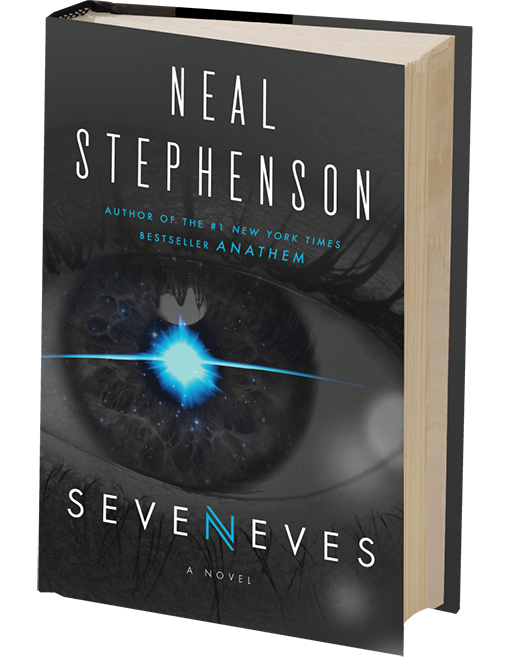5000 Years Later…

Warning: Spoilers
This is a brief rant on Seveneves, Neal Stephenson’s latest novel. I was pretty enthusiastic about the book when I first got into it. To wit:
People, people. Are you reading @nealstephenson’s new book, Seveneves? Holy shit get on it, I can’t put it down so you can’t even have mine.
— Aaron Vegh (@aaronvegh) August 1, 2015
But later in the book my excitement waned, then became bitter disappointment. This is why I’m writing this post today. To share my disappointment, to make your day a bit worse. You’re welcome.
Suffice to say, if you’ve begun reading this book and you haven’t reached the point, then you should close this window and move on with your life. Then come back.
Okay? Okay. You’ve been warned.
Seveneves is an epic tale that grabs hard from the first sentence. In our present day, our moon is destroyed by an unknown agent. Over time it becomes apparent that the fragments of the moon will get pulped by each other, and they will turn the Earth into a fiery hell for thousands of years: all life on Earth will end.
The world chooses to collaborate on launching as many people into low Earth orbit as they can. So the story is essentially the struggle of these people to live through the “hard rain”, and find a way to become a long-term viable race of humanity while the Earth burns.
It’s gripping. It’s full of amazingly well-researched facts about current space capability, orbital mechanics and (oh man, oh man) the dangers of using nuclear power for propulsion. This is science fiction at its very best. It uses our real world as the jumping-off point to speculate about a potential future. Aside from that mysterious “Agent” that destroyed the moon in the first place, this novel is grounded and present: you are invested in what’s left of the human race.
But events end up not going so well for our characters. Life in Seveneves turns out to be surprisingly cheap, and the people you’ve been getting to know tend to meet miserable ends. All this time, at the 50 percent and 60 percent point, I’m finding myself wondering, “why is this book called Seveneves, anyway? I’d have thought I’d know that by now…”
By the time our humans arrive at a point of relative safety, it becomes clear. Only eight women are there. Only seven of them are of reproductive age. They will become the new “Eves” of the human race (thanks to some genetic prowess and the saved data of all the DNA of old Earth). Wow: what a powerful, effective story. Amazing. What will happen to them next? I wonder as I turn the page taking me into the final third of the novel.
5000 Years Later
That’s what it said at the top of the next page.
What.
The.
Fudge.
I don’t know. I’m no famous book author. But it seems to me that, in the tradition of storytelling going back thousands of years, a single story is one that connects our characters from beginning to end. Not beginning-to-two-thirds-through. And you’d think that the genre of the story would also remain the same. But this one starts as solid science fiction, and then becomes fantasy, the sole product of the author’s imagination, with only the barest touchstones to the previous work.
The second story concerns the nature of humanity after the Earth is ready for resettlement. There are seven “races” of humanity, each modelled after an original “Eve”. Over the course of the final third, we get to know how their civilization worked, how they developed from that safe spot, and how they run into the descendants of some unexpected survivors on Earth.
And then it’s over.
I felt like Stephenson had a cool idea about seven women restarting humanity, got a cool title, and then built a book around it. He put his heart and soul into the lead-up, got to the Seven Eves, and then… kept writing.
As the reader, I wish he had stopped writing. And then maybe written a sequel. Because there’s even more going on here. There are tantalizing questions about the “Agent” that destroyed the moon in the first place, for example. Hinted at but unanswered.
Of course I’ll still read whatever Neal Stephenson writes, but this was one disappointing finish.